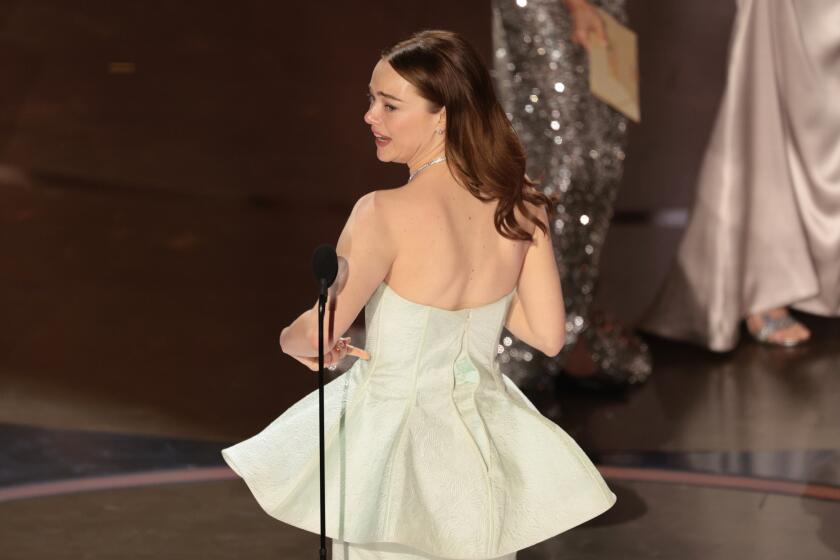Read her eyes
Hungarian-born lyric soprano Andrea Rost, currently starring in Los Angeles Opera’s “Tales of Hoffman,” is a growing presence on the international scene.
Flexing different muscles, she can now be seen in her first feature film: “Bank Ban,” Csaba Kael’s cinematic adaptation of her homeland’s most culturally significant opera. In the movie, which just completed a Santa Monica run, she plays a 13th century lady in waiting who becomes the object of sexual pursuit while her viceroy-husband is on the battlefield.
Was it a big adjustment, toning down your stage performance to achieve a more naturalistic feel?
On stage, you bring emotions into your whole body. In film, I tried to bring all the emotions into my eyes so I wouldn’t be over the top. The director wanted an “inner life” rather than movement and facial reactions. I had problems expressing myself in the first scene -- you see in my face I was nervous. The advantage of movies is that you can correct your mistakes. In opera, you can’t say, “Whoops! I want to sing that aria again.”
One critic, otherwise impressed with the movie, took issue with the fact that the score was prerecorded -- a standard procedure, it seems.
We recorded the score two months before the shoot and sang to the playback. Sometimes I just moved my lips or, in a close-up, sang an octave lower, which is less intense. Singing the real notes wouldn’t look good on screen because so many little muscles in the face and neck are working. Though the lip-syncing isn’t always perfect, you have to prerecord. You can’t have an orchestra repeat things 10 or 20 times -- and the acoustics are terrible when you’re shooting outside.
Directors such as Zeffirelli, Bergman and Carlos Saura have successfully transferred opera to the screen. But the conventional wisdom is that it’s tough to do well.
It’s not easy to make it believable because singing isn’t normal in film. Though characters don’t speak, they have to narrate the story -- and sometimes singers can’t act. In [the 1953 film version of ] “Aida,” Renata Tebaldi sang while Sophia Loren played the part. Maybe that’s the way. It’s very important to have a good face for the screen.
Despite the limitations, are film and video good for broadening the opera audience, which is getting grayer every year?
We should be making music videos for opera: setting arias to certain images and getting stars, like Michael Jackson or Nicole Kidman, to help tell the story. In my next record, we’re including a video clip with the Mozart arias, like they do with pop music. The growth of DVDs should open up the video end because the sound on VHS is so bad. Next year, I’m starring in Bellini’s “La Sonnambula,” a mix of pop culture and opera in which two huge video screens show images of sleepwalking and the subconscious onstage. It’s important to demonstrate that opera isn’t just for old people and that opera singers aren’t just big and fat.
Why isn’t “Bank Ban,” the movie, being distributed internationally?
It’s a matter of politics. Though the previous government supported the movie, this government does not. Like Shakespeare, the characters stand for something larger than themselves. The piece is seen as a protest against foreign invaders -- and, therefore, anti-Communist. It only played one day in Hungary, which is very frustrating for the cast and crew. From what I can tell, it’s just a reaction against the other side, which lost power during postproduction. A kindergarten story, really.
-- Elaine Dutka
More to Read
Only good movies
Get the Indie Focus newsletter, Mark Olsen's weekly guide to the world of cinema.
You may occasionally receive promotional content from the Los Angeles Times.






